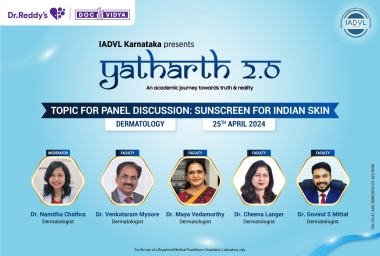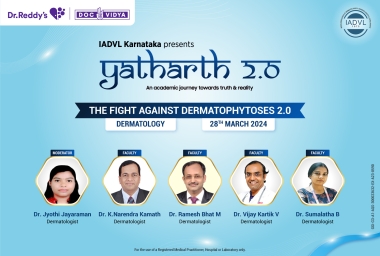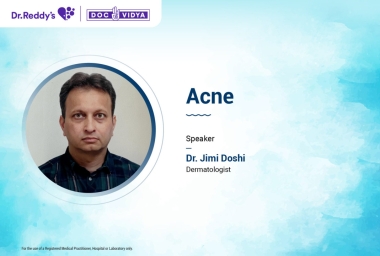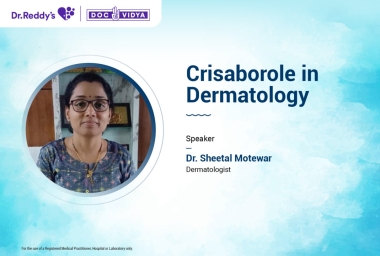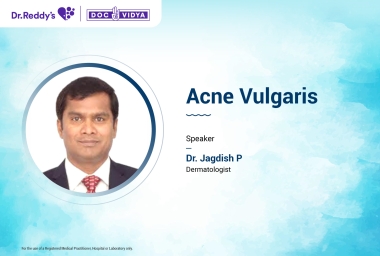button
test
test
test
test
test
test
test
test
test
test
Webinars
button
button
button
Videos
button
16 Feb
Crisaborole in Dermatology by Dr. Sheetal Motewar
Dr. Sheetal Motewar shares insights about Crisaborole in Dermatology
Crisaborole in Dermatology by Dr. Sheetal Motewar
Dr. Sheetal Motewar shares insights about Crisaborole in Dermatology
button
16 Feb
Crisaborole in Dermatology by Dr. Sheetal Motewar
Dr. Sheetal Motewar shares insights about Crisaborole in Dermatology
button
button
Courses
Medshorts

2Min Read
05 Apr
Adapalene 0.1%/benzoyl peroxide 2.5% gel and benzoyl peroxide 2.5% gel effective in preventing worsening of atrophic acne scars
According to a recent study, maintenance therapy using adapalene 0.1%/benzoyl peroxide 2.5% gel and benzoyl peroxide 2.5% gel is effective in preventing the worsening of scars in patients with acne vulgaris. This study was published in the Journal of Dermatology.
This randomized study included 126 patients, who were randomized to receive adapalene/benzoyl peroxide (n = 40), benzoyl peroxide (n = 44), and control (without maintenance treatment drugs (n = 42). Among these patients, 111 individuals completed a trial lasting for 24 weeks. The primary endpoint and one of the secondary endpoints of the study were treatment success rate (the percentage of patients in whom the number of inflammatory lesions was maintained at ≤10) and the rate of change in the number of atrophic scars, respectively.
At week 24, the treatment success rate was 89.2% in the adapalene/benzoyl peroxide group, 87.5% in the benzoyl peroxide group, and 47.4% in the control group. The treatment success rates were significantly higher in the adapalene/benzoyl peroxide and benzoyl peroxide groups compared to the control group. Additionally, the rate of change in the number of atrophic scars showed significant improvement from the baseline in the adapalene/benzoyl peroxide and benzoyl peroxide groups.
Based on these findings, it may be suggested that maintenance therapy using adapalene 0.1%/benzoyl peroxide 2.5% gel and benzoyl peroxide 2.5% gel is effective in preventing the worsening of scars in patients with acne vulgaris.

Adapalene 0.1%/benzoyl peroxide 2.5% gel and benzoyl peroxide 2.5% gel effective in preventing worsening of atrophic acne scars
According to a recent study, maintenance therapy using adapalene 0.1%/benzoyl peroxide 2.5% gel and benzoyl peroxide 2.5% gel is effective in preventing the worsening of scars in patients with acne vulgaris. This study was published in the Journal of Dermatology.
This randomized study included 126 patients, who were randomized to receive adapalene/benzoyl peroxide (n = 40), benzoyl peroxide (n = 44), and control (without maintenance treatment drugs (n = 42). Among these patients, 111 individuals completed a trial lasting for 24 weeks. The primary endpoint and one of the secondary endpoints of the study were treatment success rate (the percentage of patients in whom the number of inflammatory lesions was maintained at ≤10) and the rate of change in the number of atrophic scars, respectively.
At week 24, the treatment success rate was 89.2% in the adapalene/benzoyl peroxide group, 87.5% in the benzoyl peroxide group, and 47.4% in the control group. The treatment success rates were significantly higher in the adapalene/benzoyl peroxide and benzoyl peroxide groups compared to the control group. Additionally, the rate of change in the number of atrophic scars showed significant improvement from the baseline in the adapalene/benzoyl peroxide and benzoyl peroxide groups.
Based on these findings, it may be suggested that maintenance therapy using adapalene 0.1%/benzoyl peroxide 2.5% gel and benzoyl peroxide 2.5% gel is effective in preventing the worsening of scars in patients with acne vulgaris.

button

2Min Read
05 Apr
Adapalene 0.1%/benzoyl peroxide 2.5% gel and benzoyl peroxide 2.5% gel effective in preventing worsening of atrophic acne scars
According to a recent study, maintenance therapy using adapalene 0.1%/benzoyl peroxide 2.5% gel and benzoyl peroxide 2.5% gel is effective in preventing the worsening of scars in patients with acne vulgaris. This study was published in the Journal of Dermatology.
This randomized study included 126 patients, who were randomized to receive adapalene/benzoyl peroxide (n = 40), benzoyl peroxide (n = 44), and control (without maintenance treatment drugs (n = 42). Among these patients, 111 individuals completed a trial lasting for 24 weeks. The primary endpoint and one of the secondary endpoints of the study were treatment success rate (the percentage of patients in whom the number of inflammatory lesions was maintained at ≤10) and the rate of change in the number of atrophic scars, respectively.
At week 24, the treatment success rate was 89.2% in the adapalene/benzoyl peroxide group, 87.5% in the benzoyl peroxide group, and 47.4% in the control group. The treatment success rates were significantly higher in the adapalene/benzoyl peroxide and benzoyl peroxide groups compared to the control group. Additionally, the rate of change in the number of atrophic scars showed significant improvement from the baseline in the adapalene/benzoyl peroxide and benzoyl peroxide groups.
Based on these findings, it may be suggested that maintenance therapy using adapalene 0.1%/benzoyl peroxide 2.5% gel and benzoyl peroxide 2.5% gel is effective in preventing the worsening of scars in patients with acne vulgaris.
button

2Min Read
01 Apr
Low-molecular-weight collagen peptides supplementation promotes healthy skin
A recent study demonstrated that supplementation of low-molecular-weight collagen peptides has been found to effectively enhance various properties of human skin, including wrinkling, hydration, elasticity, and whitening. The findings of this study were published in the journal of cosmetic dermatology.
This randomized, double-blinded, placebo-controlled study included 100 healthy adult participants, who were randomly assigned to receive either low-molecular-weight collagen peptides or a placebo. The skin's parameters such as wrinkles, elasticity, hydration, and whitening (melanin and erythema indexes) were assessed at the beginning and after 4, 8, and 12 weeks.
Compared to the placebo group, the test group exhibited significant improvements in various skin measurements such as average skin roughness, maximum peak-to-valley values, maximum peak height of the wrinkle, and average maximum height of the wrinkle. Additionally, parameters related to skin elasticity, including overall elasticity, net elasticity, and biological elasticity, showed significant improvements in the test group compared to the placebo group at week 12 week. Furthermore, the test group demonstrated more significant changes in skin hydration and whitening parameters compared to the placebo group. Importantly, no adverse events related to the test product were reported by any of the participants.
Thus, it can be concluded that low-molecular-weight collagen peptides may enhance the appearance of human skin by reducing wrinkles, increasing hydration, improving elasticity, and promoting a brighter complexion.

Low-molecular-weight collagen peptides supplementation promotes healthy skin
A recent study demonstrated that supplementation of low-molecular-weight collagen peptides has been found to effectively enhance various properties of human skin, including wrinkling, hydration, elasticity, and whitening. The findings of this study were published in the journal of cosmetic dermatology.
This randomized, double-blinded, placebo-controlled study included 100 healthy adult participants, who were randomly assigned to receive either low-molecular-weight collagen peptides or a placebo. The skin's parameters such as wrinkles, elasticity, hydration, and whitening (melanin and erythema indexes) were assessed at the beginning and after 4, 8, and 12 weeks.
Compared to the placebo group, the test group exhibited significant improvements in various skin measurements such as average skin roughness, maximum peak-to-valley values, maximum peak height of the wrinkle, and average maximum height of the wrinkle. Additionally, parameters related to skin elasticity, including overall elasticity, net elasticity, and biological elasticity, showed significant improvements in the test group compared to the placebo group at week 12 week. Furthermore, the test group demonstrated more significant changes in skin hydration and whitening parameters compared to the placebo group. Importantly, no adverse events related to the test product were reported by any of the participants.
Thus, it can be concluded that low-molecular-weight collagen peptides may enhance the appearance of human skin by reducing wrinkles, increasing hydration, improving elasticity, and promoting a brighter complexion.

button

2Min Read
01 Apr
Low-molecular-weight collagen peptides supplementation promotes healthy skin
A recent study demonstrated that supplementation of low-molecular-weight collagen peptides has been found to effectively enhance various properties of human skin, including wrinkling, hydration, elasticity, and whitening. The findings of this study were published in the journal of cosmetic dermatology.
This randomized, double-blinded, placebo-controlled study included 100 healthy adult participants, who were randomly assigned to receive either low-molecular-weight collagen peptides or a placebo. The skin's parameters such as wrinkles, elasticity, hydration, and whitening (melanin and erythema indexes) were assessed at the beginning and after 4, 8, and 12 weeks.
Compared to the placebo group, the test group exhibited significant improvements in various skin measurements such as average skin roughness, maximum peak-to-valley values, maximum peak height of the wrinkle, and average maximum height of the wrinkle. Additionally, parameters related to skin elasticity, including overall elasticity, net elasticity, and biological elasticity, showed significant improvements in the test group compared to the placebo group at week 12 week. Furthermore, the test group demonstrated more significant changes in skin hydration and whitening parameters compared to the placebo group. Importantly, no adverse events related to the test product were reported by any of the participants.
Thus, it can be concluded that low-molecular-weight collagen peptides may enhance the appearance of human skin by reducing wrinkles, increasing hydration, improving elasticity, and promoting a brighter complexion.
button

2Min Read
27 Mar
Abrocitinib monotherapy safe and efficacious in preventing flares in adolescents and adults with atopic dermatitis
A recent study suggests that continuous-/reduced-dose abrocitinib or withdrawal and response to treatment reintroduction of abrocitinib in adolescents and adults with moderate-to-severe atopic dermatitis (AD) was found to be safe and efficacious in preventing flares. The study was published in The Journal of Dermatological Treatment.
The JADE REGIMEN trial was a post hoc analysis of the phase 3 JAK1 study that included 246 adolescents and 981 adults with moderate-to-severe AD. The participants (145/246 adolescents and 655/981 adults) who responded to abrocitinib 200-mg induction were randomly assigned to 40-week maintenance with 200 mg/100 mg abrocitinib or placebo. During this period, participants who experienced flare, received rescue treatment.
It was found that Eczema Area and Severity Index response due to abrocitinib 200-mg, 100-mg, and placebo arms was recaptured by 28.6%, 25.0%, and 52.9% of adolescents and 34.3%, 33.7%, and 58.0% of adults, respectively and Investigator's Global Assessment response by 42.9%, 50.0%, and 73.5% (adolescents) and 34.3%, 50.6%, and 74.1% (adults), in the three arms respectively.
From the above results, it can be concluded that abrocitinib may be effective in preventing flare in adolescents and adults with moderate-to-severe AD.

Abrocitinib monotherapy safe and efficacious in preventing flares in adolescents and adults with atopic dermatitis
A recent study suggests that continuous-/reduced-dose abrocitinib or withdrawal and response to treatment reintroduction of abrocitinib in adolescents and adults with moderate-to-severe atopic dermatitis (AD) was found to be safe and efficacious in preventing flares. The study was published in The Journal of Dermatological Treatment.
The JADE REGIMEN trial was a post hoc analysis of the phase 3 JAK1 study that included 246 adolescents and 981 adults with moderate-to-severe AD. The participants (145/246 adolescents and 655/981 adults) who responded to abrocitinib 200-mg induction were randomly assigned to 40-week maintenance with 200 mg/100 mg abrocitinib or placebo. During this period, participants who experienced flare, received rescue treatment.
It was found that Eczema Area and Severity Index response due to abrocitinib 200-mg, 100-mg, and placebo arms was recaptured by 28.6%, 25.0%, and 52.9% of adolescents and 34.3%, 33.7%, and 58.0% of adults, respectively and Investigator's Global Assessment response by 42.9%, 50.0%, and 73.5% (adolescents) and 34.3%, 50.6%, and 74.1% (adults), in the three arms respectively.
From the above results, it can be concluded that abrocitinib may be effective in preventing flare in adolescents and adults with moderate-to-severe AD.

button

2Min Read
27 Mar
Abrocitinib monotherapy safe and efficacious in preventing flares in adolescents and adults with atopic dermatitis
A recent study suggests that continuous-/reduced-dose abrocitinib or withdrawal and response to treatment reintroduction of abrocitinib in adolescents and adults with moderate-to-severe atopic dermatitis (AD) was found to be safe and efficacious in preventing flares. The study was published in The Journal of Dermatological Treatment.
The JADE REGIMEN trial was a post hoc analysis of the phase 3 JAK1 study that included 246 adolescents and 981 adults with moderate-to-severe AD. The participants (145/246 adolescents and 655/981 adults) who responded to abrocitinib 200-mg induction were randomly assigned to 40-week maintenance with 200 mg/100 mg abrocitinib or placebo. During this period, participants who experienced flare, received rescue treatment.
It was found that Eczema Area and Severity Index response due to abrocitinib 200-mg, 100-mg, and placebo arms was recaptured by 28.6%, 25.0%, and 52.9% of adolescents and 34.3%, 33.7%, and 58.0% of adults, respectively and Investigator's Global Assessment response by 42.9%, 50.0%, and 73.5% (adolescents) and 34.3%, 50.6%, and 74.1% (adults), in the three arms respectively.
From the above results, it can be concluded that abrocitinib may be effective in preventing flare in adolescents and adults with moderate-to-severe AD.
button


